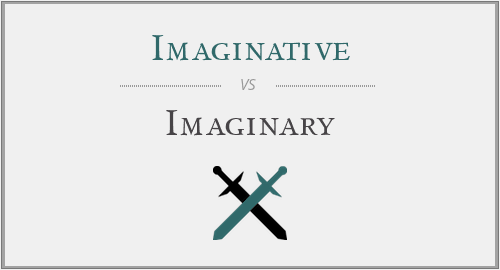Imaginative” and “imaginary” are two words that look and sound very familiar – and this is the main reason why they are often confused and used with the wrong meaning. Some people think that they are only spelled differently and their meaning is actually the same, and this is the source of so many errors in various phrases and public communications.
If you only need confirmation, whether they do or do not mean the same, well, they don’t. “Imaginative” is referring to something different than “imaginary” and they cannot be considered synonyms. But, if you need more than just a statement, if you need some help with making the difference between “imaginative” and “imaginary” and learning why and how these are spelled differently, we can help you understand the meaning of each word and how it is correctly used in each context. Keep reading the explanations and examples we provided in this article to make this simple for you!
Imaginative vs. Imaginary
Both “imaginative” and “imaginary” are adjective and they are both sourced in the noun “imagination”. But, even though both words are related to “imagination”, their meanings are not the same.
More exactly, “imaginative” is used to describe something new, something original and smart, something that hasn’t been seen or heard of before. Whereas “imaginary” is the most frequently used adjective, referring to something created by imagination, something irreal. Usually, “imaginative” is used with the same meaning as “imaginary”, but only the second one refers to something created by the mind and irreal, whereas “imaginative” refers to something creative but real and smart. Take a look on the examples below for a better understanding of these concepts.
When do we use “imaginative”?
“Imaginative” is defined as an adjective describing something clever, original and new. This word can easily be used as a synonym for “innovative”, because this is exactly what the word describes. This spelling can also refer to a quality of a person, someone who has a great, rich imagination and is good at thinking of something new and coming up with original and smart ideas.
Example 1: Their imaginative solution proved very efficient when it was tested! – “imaginative” refers to something new and original, but very smart.
Example 2: He is such an imaginative writer! – “imaginative” refers to someone who is good at thinking of new and unique ideas.
When do we use “imaginary”?
“Imaginary”, on the other hand, refers to something irreal. This is also an adjective, but it is used to describe something created by the mind, something that does not exist in reality but only in imagination.
Example: I had so many imaginary friends when I was a child! – “imaginary” refers to something unreal, something created by the mind and which only exists in the imagination of someone.
Conclusion
It is important not to confuse “imaginative” and “imaginary”, because these two similar spellings do not refer to the same thing and can change the meaning of a phrase if not used correctly. The short and essential thing to remember here is that “imaginative” and “imaginary” are two words spelled similarly but with different meanings that shouldn’t be confounded.
A simple trick to remember the correct meaning of each word is that “imaginative”, just like “innovative”, ends in “-ive”, and both words have similar meanings, referring to something new and smart, an original and clever idea; “imaginary” does not end with the same suffix, and this can be a great clue that this spelling refers to the other meaning, to something irreal, created by imagination.









Have a discussion about this article with the community:
Report Comment
We're doing our best to make sure our content is useful, accurate and safe.
If by any chance you spot an inappropriate comment while navigating through our website please use this form to let us know, and we'll take care of it shortly.
Attachment
You need to be logged in to favorite.
Log In